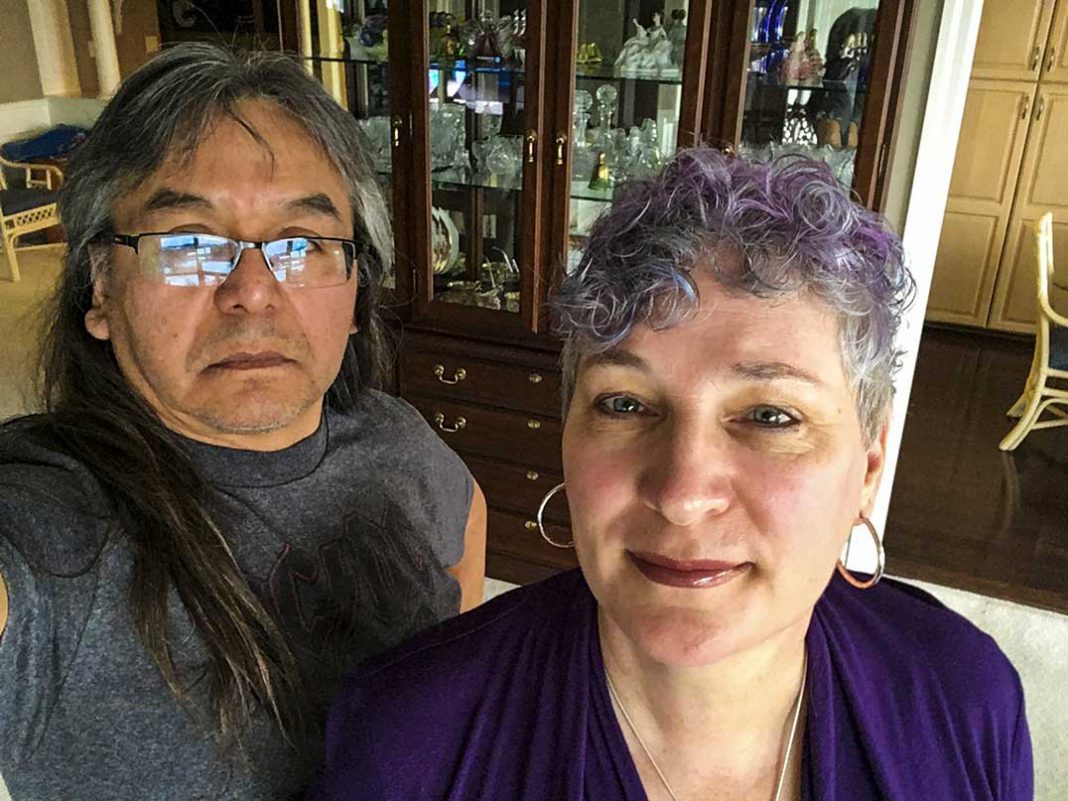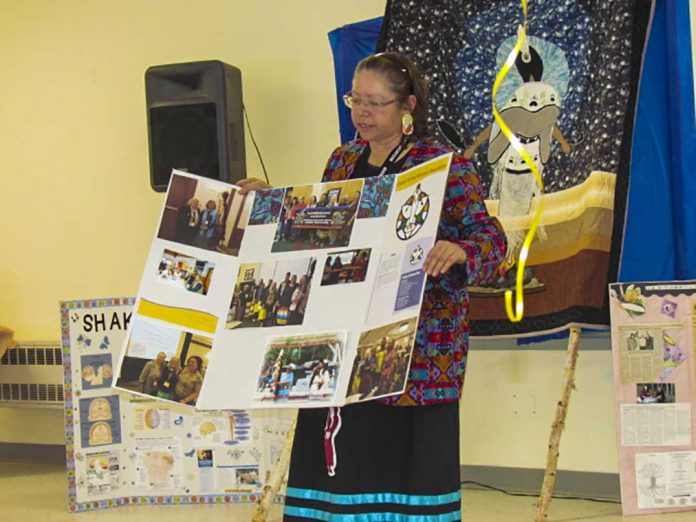Island social worker has designed sexual assault deterrance program geared to protect Anishinaabekwe
TEHKUMMAH—Michelle Hrynyk HBA, BSW, RSW, is a Tehkummah social worker who recently stepped up to fill a breach she discovered in the sexual assault resistance research literature when it came to helping Anishinaabekwe protect themselves from sexual assault.
“I was researching Indigenous sexual assault resistance programs and I couldn’t find any,” said Ms. Hrynyk, who has recently defended her master’s thesis based on a program she modified from those designed for women in general. Ms. Hrynyk joined forces with Anishinaabe elder Marie McGregor Pitawanakwat from Birch Island and community helper Mark Seabrook from Sagamok to craft a culturally appropriate version that, if the data from the programs that formed its base are any indication, has the potential to reduce assaults by as much as 50 percent.
“According to Statistics Canada, one third of Canadian women and over one half of Indigenous women have been sexually assaulted,” said Ms. Hrynyk. “Most women are sexually assaulted between ages 11 and 18. Likewise, one in five men have been sexually assaulted. Once a woman has been sexually assaulted, the possibility of being re-victimized is high. Sexual assault can negatively affect a person psychologically, physically and economically, which sets in motion long-term collateral damage not only for the victim but also for her family, employment, future health and economic stability.”
Ms. Hrynyk reached out to The Expositor after reading a series of articles featuring sexual assault survivors’ stories.
“I want to thank Destiny Douglas and Brooke Williams-Manitowabi for sharing their harrowing stories of being sexually assaulted and the challenges that they faced in the aftermath,” she said of the stories she read in The Expositor about these two women. “I am in awe of their courage, their ability to think clearly in the face of danger and their choice to share their stories. I see both of these young women as trail blazers and life changers. Through breaking the silence, they shed light on the injustices victims of sexual assault suffer on Manitoulin Island and help encourage the necessary changes we need in our society.
Ms. Hrynyk noted that “common psychological issues that survivors experience include: an inability to trust their own perceptions; intense fear of rape-related situations; distrust of one’s surroundings; an inability to understand and express emotions and reduced self-esteem. Common mental health issues experienced by sexual assault survivors include anxiety, depression, personality disorders, substance abuse, suicidal ideation and post-traumatic stress disorder. For anyone healing from the trauma of sexual assault, they need to know that the path can be difficult and it can have some rather interesting twists and turns. There are a myriad of ways of walking it. Know that you have the right to your healing and to be heard. Trust your gut and don’t ever be afraid to ask questions.”
Ms. Hrynyk left Manitoulin Family Resources over a year ago to research how to lessen the incidents of sexual assaults against Aninshinaabekwe and train further on helping people heal from trauma.
“I found some really interesting programs that could lessen sexual assaults by half, even for women who had been hurt before,” she said. “Unfortunately, I could not find any evidence-based programs for Anishinaabe women. So, I devoted my master’s thesis to developing one. I worked under the supervision of two local elders. Our preliminary model and program were shared with a focus group of local Anishinaabe helpers. Their findings can be found in my thesis which should be published this fall. My next goal is to find means to test and refine the model and ensure that within a few years, all Anishinaabe women could have access to the program that is culturally relevant, evidence-based and adaptable for their own communities.”
Ms. Hrynyk said she wants women to know that “there is hope, and sometimes, together we create it.”
The concept of resistance training is much like that which lies at the foundation of first aid training. One of the key reactions untrained people have when coming upon an injury or someone in need of medical attention is to freeze, essentially standing around the victim unsure of what to do. First aid training provides the knowledge of what to do and that galvanizes action.
“One of the main reactions to a sexual assault is for women to freeze,” noted Ms. Hyrnyk. “It is a shock and one of the body’s defence mechanisms is to freeze.”
Unfortunately, that reaction leads to the perpetrator being able to move forward with their assault. Sexual assault resistance training empowers women to know how to effectively react, and that reaction dramatically reduces incidents of sexual assault.
Ms. Hrynyk noted that she worked with Dorothy Wassegjiig-Kennedy to support a sexual assault talking circle at the Wikwemikong Healing Centre a few years ago.
“In that space I offered sharings from Western best practices and the latest evidence to support women’s wisdom,” she said. “I do believe that sharing circles like this are an essential piece of sexual assault healing for some women. They help break the silence, offer information that helps break down rape myths and foster post traumatic growth. If any elder or agency would be interested in developing a healing circle program, I am available to help in any way. I am committed to assisting women who have been sexually assaulted along on their healing journey and to find means for lessening sexual assault on this beautiful island home that we share.”
Ms. Hrynyk said that she can be reached through her email at michellehrynyk7@
gmail.com.





